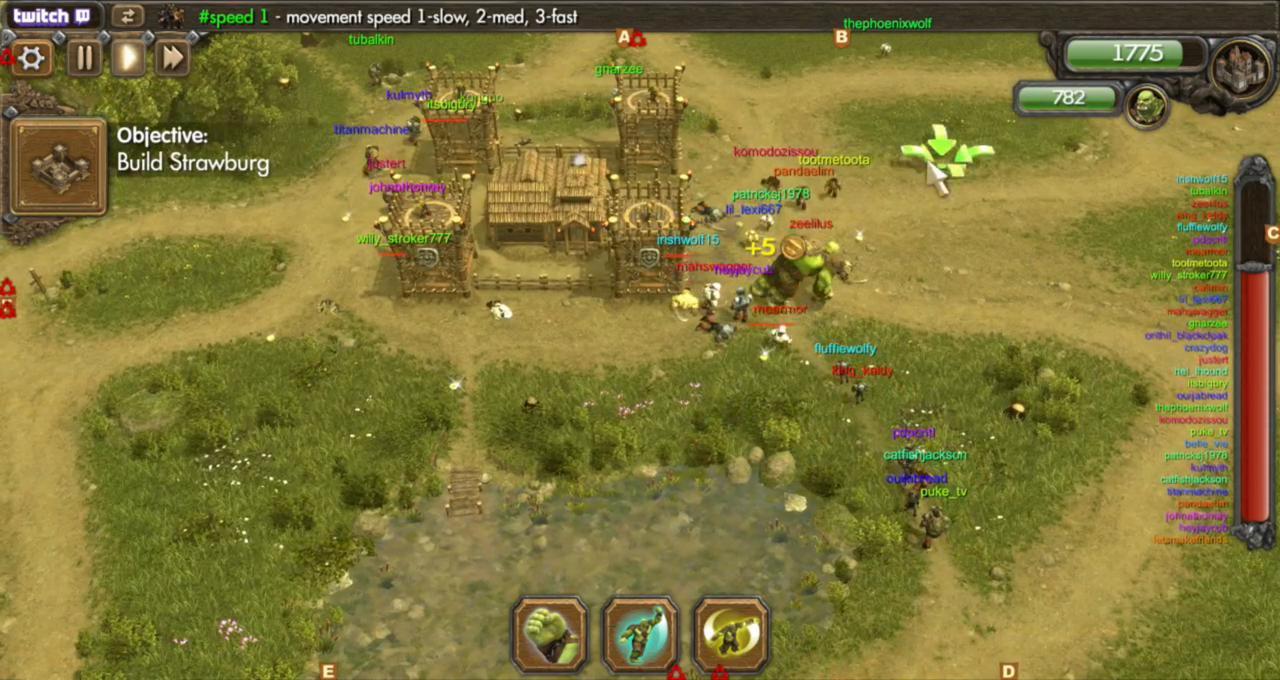One Troll Army is a multiplayer defense game being developed by FlyAnvil and produced by tinyBuild for PC. Little is currently known about the game, but it will soon be coming to Steam and keys will be sent out for the game prior to the launch.
Fallen sword facebook. Killing creatures might reward you with great items.
One Troll Army: Costume Sets $1.99 Add all DLC to Cart. About This Game Crush hundreds of minions as the powerful giant troll! Tiny Goblins call on you to protect their fort, in exchange for armor, money and new moves to smash and loot minions! Goblins build towers, barracks and catapults over each wave to help you fight back bigger minions. One Troll Army - Crush hundreds of minions as the powerful giant troll!Tiny Goblins call on you to protect their fort, in exchange for armor, money and new moves to smash and loot minions!Goblins build towers, barracks and catapults over each wave to help you fight back bigger minions and bosses!Play Against The Twitch Chat! Enable Twitch integration to allow your viewers to directly control.

In One Troll Army you will control an individual unit on the battlefield, a large Troll, upgrading him and your fort as you see fit. The interesting catch to One Troll Army is that the game itself is integrated with Twitch and you will be playing against a live Twitch chat! When you’re streaming the game, other people can control units that come in waves. Players that are part of the chat can even customize and command their own unit right from the chat window! If the chat team wins they can get points to use to upgrade their units, and if the players win they can earn points to spend on upgrades for their Troll and their fort.
If you’re ready to participate in a game like none other where you can watch players and interact with them while they Stream, then go check out One Troll Army!
See also: andState sponsored online sockpuppetry and manipulation of online views is practiced by several countries, in particular by, and.The earliest documented allegations of the existence of 'web brigades' appear to be in the April 2003 Vestnik Online article 'The Virtual Eye of ' by journalist Anna Polyanskaya (a former assistant to assassinated politician ) and two other authors, Andrey Krivov and Ivan Lomako. The authors claim that up to 1998, contributions to forums on Russian Internet sites predominantly reflected and values, but after 2000, the vast majority of contributions reflected values. This sudden change was attributed to the appearance of teams of pro-Russian commenters who appeared to be organized by the. According to the authors, about 70% of Russian Internet posters were of generally liberal views prior to 1998–1999, while a surge of 'antidemocratic' posts (about 60–80%) suddenly occurred at many Russian forums in 2000.
This could also be a reflection to the fact that access to Internet among the general Russian population soared during this time, which was until then accessible only to some sections of the society.In January 2012, a group calling itself the Russian arm of published a massive collection of email allegedly belonging to former and present leaders of the pro-Kremlin youth organization (including a number of government officials). Journalists who investigated the leaked information found that the pro-Kremlin movement had engaged in a range of activities including paying commentators to post content and hijacking blog ratings in the fall of 2011.
The e-mails indicated that members of the 'brigades' were paid 85 rubles (about US$3) or more per comment, depending on whether the comment received replies. Some were paid as much as 600,000 roubles (about US$21,000) for leaving hundreds of comments on negative press articles on the internet, and were presented with iPads. A number of high-profile bloggers were also mentioned as being paid for promoting Nashi and government activities. The Federal Youth Agency, whose head (and the former leader of Nashi) was the highest-ranking individual targeted by the leaks, refused to comment on the authenticity of the e-mails.In 2013, a report stated that 22 of 60 countries examined have been using paid pro-government commentators to manipulate online discussions, and that Russia has been at the forefront of this practice for several years, along with China and Bahrain.
In the same year, Russian reporters investigated the St. Petersburg, which employs at least 400 people. They found that the agency covertly hired young people as 'Internet operators' paid to write pro-Kremlin postings and comments, smearing opposition leader and U.S. Politics and culture. “Each commenter was to write no less than 100 comments a day, while people in the other room were to write four postings a day, which then went to the other employees whose job was to post them on social networks as widely as possible.”.
In New York City that was allegedly organized by Russians indicted by Special Counsel.Some Russian opposition journalists state that such practices create a chilling effect on the remaining in the country.Further investigations were performed by Russian opposition newspaper and in 2014–15, inspired by the peak of activity of the pro-Russian brigades during the. The effort of using 'troll armies' to promote Putin's policies is reported to be a multimillion-dollar operation. According to an investigation by the British newspaper, the flood of pro-Russian comments is part of a coordinated 'informational-psychological war operation'. One bot network was documented to use more than 20,500 fake Twitter accounts to spam negative comments after the death of Boris Nemtsov and events related to the Ukrainian conflict.An article based on the original Polyanskaya article, authored by the Independent Customers' Association, was published in May 2008 at Expertiza.Ru. In this article the term web brigades is replaced by the term Team 'G'.During, Donald Trump retweeted a tweet from an account operated by Russians.
Methods Web brigades commentators sometimes leave hundreds of postings a day that criticize the country's opposition and promote Kremlin-backed policymakers. Commentators simultaneously react to discussions of 'taboo' topics, including the historical role of Soviet leader, political opposition, dissidents such as, murdered journalists, and cases of international conflict or rivalry (with countries such as, and Ukraine, but also with the foreign policies of the United States and the ).
Prominent journalist and Russia expert believes Russia's efforts are aimed at confusing the audience, rather than convincing it. He states that they cannot censor information but can 'trash it with conspiracy theories and rumours'.To avert suspicions, the users sandwich political remarks between neutral articles on travelling, cooking and pets.
 Galaga 30th Collection is an iOS arcade video game collection by Namco Bandai.It was made to celebrate the 30th anniversary of the Galaga arcade game. It allows users to play remakes of the games in the Galaga series. It is free to download and comes with Galaga's predecessor, Galaxian.The remakes of Galaga, Gaplus, and Galaga '88 are available as in-app purchases either separately or as a.
Galaga 30th Collection is an iOS arcade video game collection by Namco Bandai.It was made to celebrate the 30th anniversary of the Galaga arcade game. It allows users to play remakes of the games in the Galaga series. It is free to download and comes with Galaga's predecessor, Galaxian.The remakes of Galaga, Gaplus, and Galaga '88 are available as in-app purchases either separately or as a.
They overwhelm comment sections of media to render meaningful dialogue impossible. “The effect created by such Internet trolls is not very big, but they manage to make certain forums meaningless because people stop commenting on the articles when these trolls sit there and constantly create an aggressive, hostile atmosphere toward those whom they don’t like. The trolls react to certain news with torrents of mud and abuse. This makes it meaningless for a reasonable person to comment on anything there.”A collection of leaked documents, published by Moy Rayon, suggests that work at the 'troll den' is strictly regulated by a set of guidelines. Any blog post written by an agency employee, according to the leaked files, must contain 'no fewer than 700 characters' during day shifts and 'no fewer than 1,000 characters' on night shifts. Use of graphics and keywords in the post's body and headline is also mandatory. In addition to general guidelines, bloggers are also provided with 'technical tasks' – keywords and talking points on specific issues, such as Ukraine, Russia's internal opposition and relations with the West.
On an average working day, the workers are to post on news articles 50 times. Each blogger is to maintain six Facebook accounts publishing at least three posts a day and discussing the news in groups at least twice a day. By the end of the first month, they are expected to have won 500 subscribers and get at least five posts on each item a day. On Twitter, the bloggers are expected to manage 10 accounts with up to 2,000 followers and tweet 50 times a day.In 2015, Lawrence Alexander disclosed a network of propaganda websites sharing the same Google Analytics identifier and domain registration details, allegedly run by Nikita Podgorny from Internet Research Agency. The websites were mostly repositories focused on attacking Ukraine, Russian opposition and Western policies.
Other websites from this cluster promoted president Putin and Russian nationalism, and spread alleged news from Syria presenting anti-Western and pro- viewpoints.In August 2015, Russian researchers correlated Google search statistics of specific phrases with their geographic origin, observing increases in specific politically loaded phrases (such as 'Poroshenko', 'Maidan', 'sanctions') starting from 2013 and originating from very small, peripheral locations in Russia, such as Olgino, which also happens to be the headquarters of the company. The Internet Research Agency also appears to be the primary sponsor of an anti-Western exhibition.Since 2015, Finnish reporter has inquired into web brigades and Russian trolls. In addition, Western journalists have referred to the phenomenon and have supported traditional media.In May 2019, it was reported that a study from the found that Russian Twitter bots had tried to inflame the United States' anti-vaccination debate by posting opinions on both sides in 2018.In June 2019 a group of 12 editors introducing coordinated pro-government and anti-opposition bias was blocked on the Russian-language Wikipedia. In July 2019 two operatives of the Internet Research Agency were detained in Libya and charged with attempting to influence local elections. They were reportedly employees of Alexander Malkevich, manager of USA Really, a propaganda website. See also.